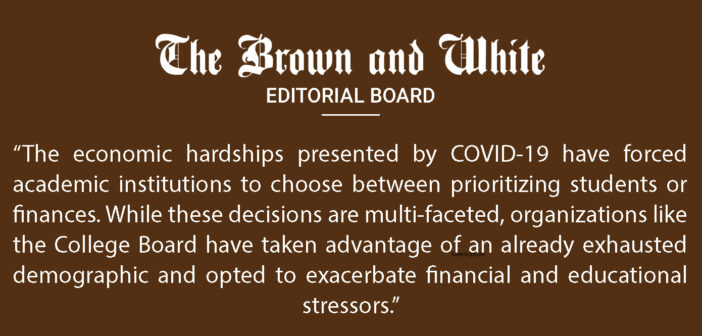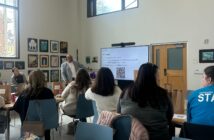This year has been a year of constant change.
The pandemic has made us completely rework the way we carry out our daily lives. We lived through a tumultuous election and the switch from the Trump administration to the Biden administration. We saw hundreds of social movements across the nation fighting for justice and calling for change.
Students especially, have felt the weight of the impacts from the pandemic, as what we knew to be education is now essentially unrecognizable.
Everything from our classes to our exams is done digitally, and students and faculty are doing the best they can to just make it work. However, technology is unreliable, so adapting to this form of education is a continuous learning curve.
High school juniors and seniors are not only having to deal with adjusting online school, but also the virtual college application process.
The ACT and SAT were digitized and most colleges and universities have shifted to virtual tours.
Understanding the additional difficulty that comes with navigating this entire process online, many colleges and universities chose this year to have their application process be test optional.
The College Board, however, has not been as understanding. In fact, it has been quite the opposite.
The College Board has recently changed the Advanced Placement (AP) test guidelines to make the test more difficult to mitigate dishonest test-taking behaviors.
The board has made it so students cannot go back to look at questions after they answered them and have made it so that tests “will not include questions that can be answered with internet searches, textbooks, notes, study guides, or similar material.”
The new test guidelines are completely inconsiderate to the issues and changes that this past year has brought upon students across the country.
Many online courses meet significantly less than they would in an in-person setting, hence making it impossible for students to learn the same amount of content that they normally would. The pandemic has also exacerbated economic difficulty across the nation, and the switch to online learning has disproportionately affected BIPOC and lower income students.
These students are not getting the same education as they were in-person setting, so making these already difficult tests harder when students are learning substantially less, is unfair.
Students are not responsible for the pandemic, nor are they responsible for how it has affected their own education systems, so why is the College Board trying to make them victims of it?
These issues go past the board, and extend to many educational corporations and institutions.
Lehigh has shown this past year that they will do everything they can to prioritize getting as much income they can over their student body’s quality of experience.
Despite the obvious economic challenges that the pandemic has presented for students and families, Lehigh has announced another four percent increase in tuition in the upcoming academic school year. Also, they admitted significantly more students via Early Decision for the class of 2025, which creates more competition for students who rely on financial aid as students that apply Early Decision are statistically more likely to be able to pay tuition in full. Through admission’s eyes, they’re a guaranteed check in the bank.
This is in keeping with their behavior regarding the 10 percent tuition decrease for students who chose to be “fully remote” for the last two semesters, while taking away on-campus housing for sophomores and juniors and encouraging them to find alternatives in South Bethlehem so they can still pay for limited campus privileges. Lehigh continuously opts to give students with the ability to pay more an enhanced experience and greater benefits.
In efforts to secure as many students returning to campus next fall, Lehigh has guaranteed that campus will be “back to normal” in the fall, promising a full return to on-campus housing, in-person classes and full access to academic resources and extracurricular activities. All of this was said without any actual proof to suggest where we will be at that point in the pandemic, other than the hope that most students will be vaccinated come August.
The economic hardships presented by COVID-19 have forced academic institutions to choose between prioritizing students or finances. While these decisions are multi-faceted, organizations like the College Board have taken advantage of an already exhausted demographic and opted to exacerbate financial and educational stressors.
There is no easy answer to the economic impact the pandemic has presented to academia, however making circumstances increasingly difficult for already suffering students is not the solution.
Rather than trying to take each other down in our attempts to survive the mess that this year has been, educational institutions should be doing more to offset their fiscal challenges by best serving their existing student bodies as opposed to creating further obstacles for those to come.






Comment policy
Comments posted to The Brown and White website are reviewed by a moderator before being approved. Incendiary speech or harassing language, including comments targeted at individuals, may be deemed unacceptable and not published. Spam and other soliciting will also be declined.
The Brown and White also reserves the right to not publish entirely anonymous comments.